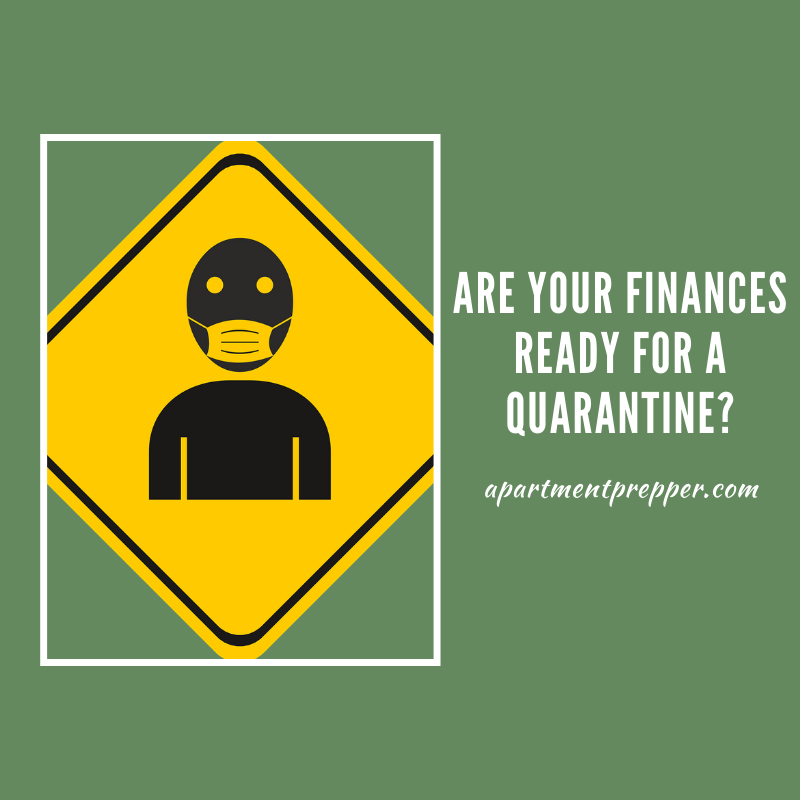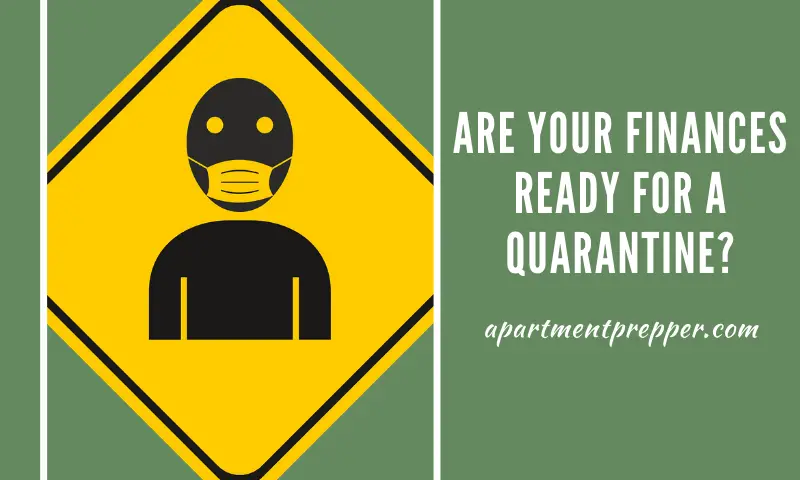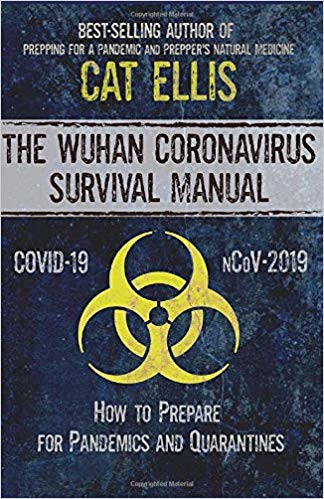This post is by Bernie Carr, apartmentprepper.com
Every day, we hear about more and more cases of the Wuhan coronavirus, also known as COVID-19 in many countries around the world, including the U.S. The CDC has warned there could be significant disruptions to everyday life here in the U.S.
It is not so far-fetched to imagine there may cases in your own city that are yet unknown. Besides the health and human cost, there is also a financial cost. What happens to your finances when a mandatory quarantine is enforced or if you decide to self-quarantine? Even if there is no quarantine, but there are cases in your city, you may decide to do your own “social distancing,” that is, staying away from crowds and other public areas.
Millions of people in China are already in quarantine and unable to go to work. Entire factories have shut down. Being unable to work means no paycheck. How will you pay your bills?
Many people already live paycheck to paycheck and being unable to work would be a disaster in itself.
What can you do to prepare your finances?
Let’s look at some practical things that come to mind.
You may not be able to pay with cash
Don’t get me wrong – I like paying in cash. But paper currency and change also carry viruses and bacteria. The Chinese government has started to burn or disinfect cash because of the risks of passing the coronavirus. If coronavirus is spreading in your city, avoid touching cash. You’ll need to designate a card for purchases.
Bill paying
Many people pay with checks or even in person at their utility companies. If there is a quarantine in your city, avoid having to go to the post office or even the mailbox in your apartment by paying your bills online.
Rent payment
Avoid having to drop off payments at the leasing office – see if you can pay your rent online as well. In case you get sick: pay attention to dates in your lease:
- When is the rent considered late?
- What are the penalties for being late?
- To avoid being late in your rent, designate someone who can help you set up rent payments if you are in the hospital.
Get direct deposit
Another possibility that can happen is banks can close if there is a quarantine in a certain area. Make sure you get your check direct-deposited to your account instead of receiving paper checks. This way you do not have to go the bank – less exposure, and less risk.
Your job
Your job may be affected if you go into self-isolation or quarantine, as you will be unable to show up at work. Check with your employer on what is their contingency plan if there is a quarantine. Are they willing to allow you to telecommute or work in another location if there is a quarantine?
Your employee benefits
Medical
Get very familiar with your medical plan – what is covered, what is your deductible, in case you get sick.
- Find out if there are any options for telemedicine – you may want to consult with a doctor online via a virtual visit. I tried a virtual doctor visit and was pleased with the result.
- If you are in a quarantine, you may be unable to go to the pharmacy to pick up your prescriptions. You should find out if your prescription plan will allow you to order your regular prescriptions (for any chronic conditions) in bulk. Of course you may have to ask your physician to authorize your refills.
Paid time off
View how many “paid time off” (sick days or vacation days) you currently have that you can use in case you are placed under quarantine.
Short term disability
See if you have a short term disability benefit in case you are ill for a period of time.
Family leave
Some companies offer the option of taking some time away from work to care for a new baby, an ill family member etc. Now is the time to check with your human resources contact and find out what benefits may be helpful to you.
Backup childcare
One of the first things cities that have coronavirus cases do is to close the schools. If your children are unable to go to school, you will need childcare at home, or you may have to take time off from work. You will need to find a backup sitter, or work out some kind of arrangement with other parents in your area, i.e., taking turns taking days off to watch each others’ kids. Of course this is also assuming no one is sick.
Unfortunately, having to pay a backup sitter will also cost you extra. You may have already pre-paid the daycare center at school, but if the school is closed, you will need to pay the backup sitter as well.
Check with the school officials at your child’s school officials on whether there is an option of online classes should schools close due to the coronavirus.
How will you pay your bills?
Save some money now, and set it aside so you have at least a month to three months worth of expenses covered.
Travel plans
Many people prepay for trips and cruises months or even years in advance. Many people are still going on planned trips even now, while we are in the early stages of the coronavirus spread. Consider your options:
- Will you move forward with travel plans?
- What if there is a quarantine in the country you plan to visit? It might be a good idea to purchase trip insurance in case your plans get disrupted. But read the fine print, as some travel insurance plans may not cover trips to countries with specified level of travel advisories (example: Level 4: Do Not Travel)
- What protections do your credit cards offer?
Check the U.S. Department of State for the latest travel advisories.
The same considerations should go into planning or pre-purchasing tickets for concerts, sports and other events.
Have some supplies
If there is a quarantine in your area, supplies may not get delivered if trucks are not allowed in. Water and power may still be running. As we see in the quarantined areas in China, people still have utilities. Trash pickup may be delayed if drivers are quarantined.
You should have about six weeks worth of food, supplies such as toilet paper, antibacterial wipes, personal care, first aid supplies, prescription medicines, laundry soap, trash bags, etc. For more details, see How an Average Person can Prepare for a Pandemic.
The more you know, the more you can prepare. I recommend you read Cat Ellis new book for practical advice:
Save some money
You will need an emergency fund to be able to pay your bills in case you are unable to work. Here are a few ideas to raise some quick cash now, before more cases of coronavirus spread. If nothing happens in your city, you’ll still have an emergency fund.
- Sell un-needed items. Hold a garage sale. Check neighborhood Facebook groups, Craigslist or Ebay. When meeting with a buyer, make sure you meet in a public place.
- Pay the minimum on your credit card bills for now, so you can save for an emergency fund.
- Stop getting into more debt.
- Lower your bills by dropping services you are no longer using – if you are not watching all your cable channels, investigate options on cutting cable.
- Make things yourself instead of buying.
- Sell gift cards you will never use.
- Stop eating out.
- Get a short-term, part-time job.
No one knows how things will turn out with the spread of coronavirus. It is prudent to consider the possibilities and make plans now on how you would deal with the virus spread and quarantine in case it comes to that.
We are an affiliate of Amazon.com, which means we received a small commission if you click through one of our Amazon links when you shop, at totally no cost to you. This helps keep the lights on at the blog. Thanks!




With the costs of basic needs keep rising and the stock market plummeting (401K’s included) and the continual rise of health care costs and battling with insurances, those of us with chronic illness, like me, are always in an uphill climb with no end in sight. I have tried applying for assistance but was denied because my husband makes too much and am on my 4th year trying to get disability (still waiting). So hypothetically, we do all of the suggestions (and we have/are) and it is still not working to get ahead, then what?
Hi Tiff, I agree, it is an uphill struggle for many of us, including high deductible plans that one can never meet.. I wish I had a quick answer for you but I am not a financial planner. I just heard FEMA is preparing for a possible coronavirus emergency declaration which may free up funds for communities. All we can do is be aware and prepare as best as we can. Thanks for the comment.